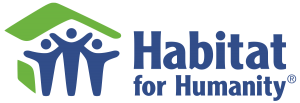With support from Habitat for Humanity, Blue Cross finds a new approach to help Minnesotans purchase their first homes
September 26, 2023In a first-of-its-kind partnership, Blue Cross has teamed up with Twin Cities Habitat for Humanity to provide down payment assistance for qualifying first-time homebuyers in Minnesota.
As a member of the Federal Home Loan Bank of Des Moines – one of 11 regional locations of the national Federal Home Loan Bank (FHLB) system – Blue Cross was familiar with the organization’s assistance programs for low – and moderate income households. Historically, funds from these programs were accessed and distributed through traditional financial institutions, such as commercial banks and credit unions.
Blue Cross’ treasury team, led by May Vang, was determined to find a way to utilize its FHLB membership in ways that could advance the insurer’s commitment to addressing inequities in social factors like housing security that have a real impact on health.
 Enter Twin Cities Habitat for Humanity (Habitat). In an innovative partnership structure, the non-profit agreed to come on board with Blue Cross to serve as the grant underwriter and distributor for funds available through FHLB of Des Moines’ down payment programs. A total of $160,000, funded from two programs – HomeStart and the Native American Homeowner Initiative – will provide grants of up to $5,000 for qualifying individuals.
Enter Twin Cities Habitat for Humanity (Habitat). In an innovative partnership structure, the non-profit agreed to come on board with Blue Cross to serve as the grant underwriter and distributor for funds available through FHLB of Des Moines’ down payment programs. A total of $160,000, funded from two programs – HomeStart and the Native American Homeowner Initiative – will provide grants of up to $5,000 for qualifying individuals.
“There are many factors that go into building a healthy life,” said May Vang, vice president, treasury and chief investment officer at Blue Cross. “Housing is a major external factor outside of the healthcare system that has an impact on a person's health. This grant program supports our commitment to break down barriers and build up opportunities for housing stability that allow people to live their healthiest lives.”

A shared determination to find a way
“After buying their quality, affordable homes, clients report better health, fewer visits to the doctor, and improved mental health,” said Betsy Mills, vice president of finance and lending at Twin Cities Habitat for Humanity. “We’re grateful to Blue Cross for creatively leveraging this funding opportunity, which helps to expand equitable access to affordable homeownership and, ultimately, will strengthen health and wellbeing for dozens of families in the Twin Cities community.”
A shared mission to alleviate social barriers
Habitat’s mission intersects with Blue Cross’ own by way of improving population health at both the individual and population levels, as both organizations are committed to providing support for underserved communities and addressing racial inequities.
Nash Shaikh, chief of staff at Blue Cross, currently serves as vice chair of the Twin Cities Habitat for Humanity board. For Shaikh, the position aligns with Blue Cross’ commitment to address social determinants of health through a stable housing approach.
“My involvement with Habitat affords me a broader perspective of my abilities to give back to the Twin Cities community – helping to ensure people can live their healthiest lives – by contributing to a cause greater than myself, which is more crucial now than ever,” she said.
Shaikh is not alone. Blue Cross fosters a culture of care and giving back with ample community engagement opportunities for associates to invest in through an established volunteer paid time off (VTPO) designation. In 2022, more than 120 Blue Cross associates opted to use their VTPO with Twin Cities Habitat for Humanity, devoting more than 1,145 hours of time with the organization.

Momentum can help to drive greater change
Since the inception of its Affordable Housing Program in 1990, FHLB Des Moines has awarded more than $844 million to provide affordable housing opportunities to more than 124,000 families and individuals.
“We hope that our innovative solution can be an example for other organizations looking to make a difference in the communities that they serve as well, and that they are vocal about it,” notes Vang. “Bringing awareness to efforts being made will likely make a bigger impact and help close gaps in housing inequities even further.”


